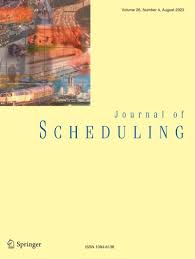MISTA 2027: Call for Papers
The 2027 conference will be held in Tours, France (7-11 June 2027).
For important dates please see the Dates page
This conference is the 10th in the conference series.
The conference serves as a forum for an international community of researchers, practitioners and vendors on all aspects of multi-disciplinary scheduling.
The conference will cover, but not be limited to, the following disciplines:- Artificial Intelligence
- Computer Science
- Engineering
- Management
- Manufacturing
- Mathematics
- Operational Research
The aim is to bring together scheduling researchers and practitioners from all the disciplines that engage with scheduling research. The scope of the conference includes (but is not limited to):
- Agent Based Scheduling
- Algorithmics
- Applications
- Automated Reasoning
- Batch Scheduling
- Commercial Packages
- Complexity of Scheduling Problems
- Constraint Logic Programming
- Delivery Scheduling
- Evolutionary Algorithms
- Heuristic Search
- Knowledge-Based Systems
- Large Scale Scheduling
- Local Search
- Machine Scheduling
- Meta-heuristic Search
- Multi-processor Scheduling
- Process Scheduling
- Production Scheduling
- Real World Scheduling
- Real-Time Scheduling
- Rostering
- Rule-Based Expert Systems
- Shop-Floor Scheduling
- Sports Scheduling
- Theoretical Scheduling
- Timetabling
- Transport Scheduling
- Vehicle Routing
Theoretical as well as more pratical oriented submissions are welcome as long as they bring significant contributions to the field of planning or scheduling.
Submission Details
Authors are invited to submit papers in one of two categories:
- Full Papers: These paper must present mature contributions and are limited to 8 pages.
- Extended Abstracts: These shorter papers (limited to 4 pages) concern on-going research that are worth being presented at the conference.
Submissions will be thoroughly peer-reviewed by at least two referees and accepted contributions are expected to be presented at the time of the conference. All accepted contributions will be included in the conference proceedings and are eligible for submission in the journal special issue following the conference.
Formatting Guidelines
Both Word templates and Latex styles are available from here. We will only accept PDF file that have been formatted using these formatting styles.
Special Issue
Post conference, there will be a call for papers for a special issue of Journal of Scheduling.

Journal of Scheduling is a well-reputated journal with high standards in the field of Scheduling (ranked Q1/Q2 according to Scimago). It provides a perfect support for the publication of research from both young or more experienced researchers.
Researchers who present their work at the conference will be encouraged to submit an extended version of their research to the special issue. The publication of the this issue is expected within the next months following the conference.

